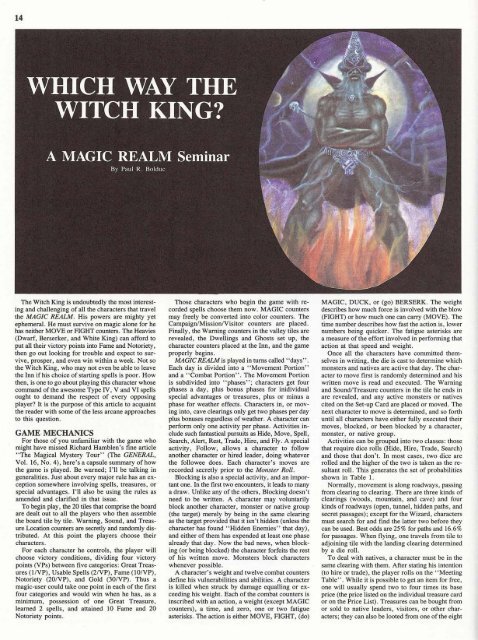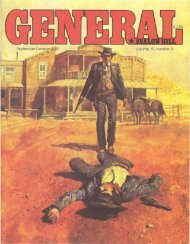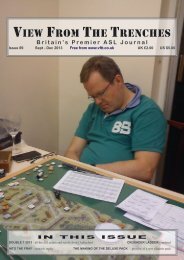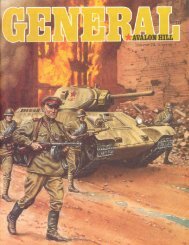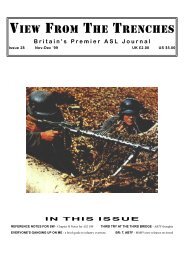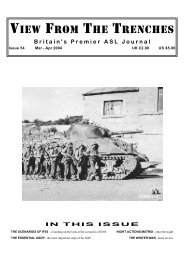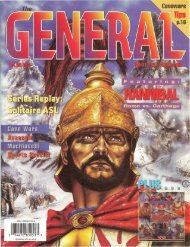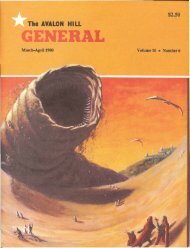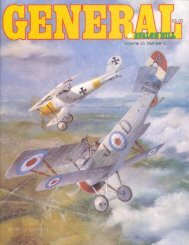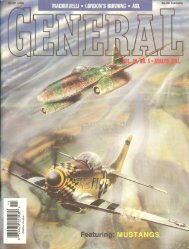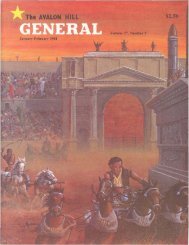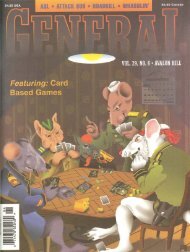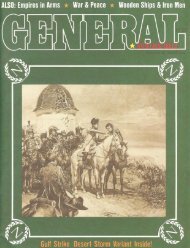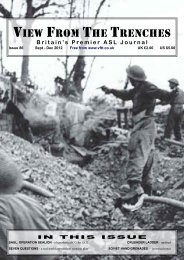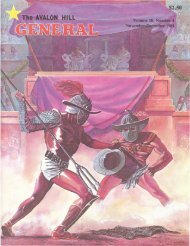general - View From The Trenches
general - View From The Trenches
general - View From The Trenches
- TAGS
- trenches
- www.vftt.co.uk
Create successful ePaper yourself
Turn your PDF publications into a flip-book with our unique Google optimized e-Paper software.
14<br />
<strong>The</strong> Witch King is undoubtedly the most interesting<br />
and challenging of all tbe characters that travel<br />
tbe MAGIC REALM. His powers are mighty yet<br />
ephemeral. He must survive on magic alone for he<br />
has neitber MOVE or FIGHT counters. <strong>The</strong> Heavies<br />
(Dwarf, Berserker, and White King) can afford to<br />
put all tbeir victory points into Fame and Notoriety,<br />
then go out looking for trouble and expect to survive,<br />
prosper, and even win witbin a week. Not so<br />
the Witch King, who may not even be able to leave<br />
the Inn if his choice of starting spells is poor. How<br />
tben, is one to go about playing tbis character whose<br />
command of the awesome Type IV, V and VI spells<br />
ought to demand the respect of every opposing<br />
player? It is the purpose of this article to acquaint<br />
the reader with some of the less arcane approaches<br />
to this question.<br />
GAME MECHANICS<br />
For those of you unfamiliar with the game who<br />
might have missed Richard Hamblen's fine article<br />
"<strong>The</strong> Magical Mystery Tour" (<strong>The</strong> GENERAL,<br />
Vol. 16, No.4), here's a capsule summary of how<br />
the game is played. Be warned; I'll be talking in<br />
<strong>general</strong>ities. Just about every major rule has an exception<br />
somewhere involving spells, treasures, or<br />
special advantages. I'll also be using the rules as<br />
amended and clarified in that issue.<br />
To begin play, tbe 20 tiles tbat comprise tbe board<br />
are dealt out to all the players who tben assemble<br />
the board tile by tile. Warning, Sound, and Treasure<br />
Location counters are secretly and randomly distributed.<br />
At this point the players choose their<br />
characters.<br />
For each character he controls, tbe player will<br />
choose victory conditions, dividing four victory<br />
points (VPs) between five categories: Great Treasures<br />
(l/VP), Usable Spells (2/VP), Fame (IO/VP),<br />
Notoriety (20/VP), and Gold (30/VP). Thus a<br />
magic-user could take one point in each of the first<br />
four categories and would win when he has, as a<br />
minimum, possession of one Great Treasure,<br />
learned 2 spells, and attained 10 Fame and 20<br />
Notoriety points.<br />
Those characters who begin tbe game with recorded<br />
spells choose tbem now. MAGIC counters<br />
may freely be converted into color counters. <strong>The</strong><br />
Campaign/Mission/Visitor counters are placed.<br />
Finally, tbe Warning counters in tbe valley tiles are<br />
revealed, tbe Dwellings and Ghosts set up, tbe<br />
character counters placed at tbe Inn, and tbe game<br />
properly begins.<br />
MAGIC REALM is played in turns called "days".<br />
Each day is divided into a "Movement Portion"<br />
and a "Combat Portion". <strong>The</strong> Movement Portion<br />
is subdivided into "phases"; characters get four<br />
phases a day, plus bonus phases for inidividual<br />
special advantages or treasures, plus or minus a<br />
phase for weather effects. Characters in, or moving<br />
into, cave clearings only get two phases per day<br />
plus bonuses regardless of weatber. A character can<br />
perform only one activity per phase. Activities include<br />
such fantastical pursuits as Hide, Move, Spell,<br />
Search, Alert, Rest, Trade, Hire, and Fly. A special<br />
activity, Follow, allows a character to follow<br />
another character or hired leader, doing whatever<br />
the foliowee does. Each character's moves are<br />
recorded secretly prior to the Monster Roll.<br />
Blocking is also a special activity, and an important<br />
one. In tbe first two encounters, it leads to many<br />
a draw. Unlike any of the otbers, Blocking doesn't<br />
need to be written. A character may voluntarily<br />
block anotber character, monster or native group<br />
(the target) merely by being in tbe same clearing<br />
as tbe target provided tbat it isn't hidden (unless tbe<br />
character has found "Hidden Enemies" that day),<br />
and either of them has expended at least one phase<br />
already tbat day. Now tbe bad news, when blocking<br />
(or being blocked) the character forfeits tbe rest<br />
of his written move. Monsters block characters<br />
whenever possible.<br />
A character's weight and twelve combat counters<br />
define his vulnerabilities and abilities. A character<br />
is killed when struck by damage equalling or exceeding<br />
his weight. Each of the combat counters is<br />
inscribed with an action, a weight (except MAGIC<br />
counters), a time, and zero, one or two fatigue<br />
asterisks. <strong>The</strong> action is either MOVE, FIGHT, (do)<br />
MAGIC, DUCK, or (go) BERSERK. <strong>The</strong> weight<br />
describes how much force is involved witb tbe blow<br />
(FIGHT) or how much one can carry (MOVE). <strong>The</strong><br />
time number describes how fast the action is, lower<br />
numbers being quicker. <strong>The</strong> fatigue asterisks are<br />
a measure of tbe effort involved in performing that<br />
action at that speed and weight.<br />
Once all the characters have committed themselves<br />
in writing, the die is cast to determine which<br />
monsters and natives are active tbat day. <strong>The</strong> character<br />
to move first is randomly determined and his<br />
written move is read and executed. <strong>The</strong> Warning<br />
and Sound/Treasure counters in the tile he ends in<br />
are revealed, and any active monsters or natives<br />
cited on the Set-up Card are placed or moved. <strong>The</strong><br />
next character to move is determined, and so forth<br />
until all characters have either fully executed their<br />
moves, blocked, or been blocked by a character,<br />
monster, or native group.<br />
Activities can be grouped into two classes: those<br />
that require dice rolls (Hide, Hire, Trade, Search)<br />
and those that don't. In most cases, two dice are<br />
rolled and the higher of the two is taken as the resultant<br />
roll. This generates the set of probabilities<br />
shown in Table I.<br />
Normally, movement is along roadways, passing<br />
from clearing to clearing. <strong>The</strong>re are three kinds of<br />
clearings (woods, mountain, and cave) and four<br />
kinds of roadways (open, tunnel, hidden paths, and<br />
secret passages); except for the Wizard, characters<br />
must search for and find tbe latter two before tbey<br />
can be used. Best odds are 25 % for patbs and 16.6%<br />
for passages. When flying, one travels from tile to<br />
adjoining tile with tbe landing clearing determined<br />
by a die roll.<br />
To deal with natives, a character must be in tbe<br />
same clearing witb them. After stating his intention<br />
(to hire or trade), tbe player rolls on tbe "Meeting<br />
Table". While it is possible to get an item for free,<br />
one will usually spend two to four times its base<br />
price (tbe price listed on tbe individual treasure card<br />
or on tbe Price List). Treasures can be bought from<br />
or sold to native leaders, visitors, or other characters;<br />
they can also be looted from one ofthe eight


